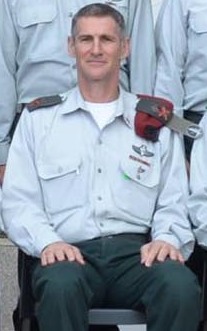 On May 4th, the eve of Holocaust Memorial Day, Israel’s Deputy Chief of Staff,
Major General Yair Golan spoke at Israel’s Massuah Institute for Holocaust Studies. He called for national
introspection on Holocaust Memorial Day and warned that processes witnessed in Germany in the 1930s and 1940s
are budding in Israel today.
On May 4th, the eve of Holocaust Memorial Day, Israel’s Deputy Chief of Staff,
Major General Yair Golan spoke at Israel’s Massuah Institute for Holocaust Studies. He called for national
introspection on Holocaust Memorial Day and warned that processes witnessed in Germany in the 1930s and 1940s
are budding in Israel today.
Golan’s bold speech created a storm. Right-wing politicians brutally attacked him, as did some pundits.
Israelis heard and read portions of Maj. Gen. Golan’s speech. English speakers saw short quotes, taken out of the broader context.
For the benefit of English speakers, here is a translation of the bulk of the speech, which came after some personal notes about Golan’s visit to a Holocaust museum in a small village in Germany, where he saw photos of his family members who had lived there and were murdered in the Holocaust. Golan went on saying:
“The Holocaust, in my opinion, must lead us to a deep reflection on the nature of the human, even when that human is ourselves; It must lead us to a deep reflection on the responsibilities of leadership, and on the quality of society. It must lead us to think thoroughly about how we - here and now – treat the foreigner, the widow and the orphan, and those similar to them.
The Holocaust must lead us to think about our public life, and even more so, it must lead all those who can - not just those who want - to bear public responsibility. Because If there is something that scares us about the memory of the Holocaust, it is identifying nauseating processes that occurred in Europe in general and Germany in particular, 70, 80 and 90 years ago, and finding evidence of their presence here among us, today, in 2016.
For there is nothing easier than hating the alien. Nothing is easier and more simple than provoking anxiety and horror. Nothing is easier and simpler than brutalization, jadedness and self-righteousness.
On Holocaust memorial day, it is appropriate to discuss our own ability to uproot from our midst signs of intolerance, signs of violence, ad self-destruction on the path toward moral deterioration. In fact, Holocaust Memorial Day is an opportunity for introspection. If Yom Kippur is a day of private reckoning, then is it proper and even necessary for Holocaust Memorial Day to be a day for national soul-searching. And in this national soul-searching we must include some unsettling phenomena.
Several weeks ago a public debate erupted regarding the question of the ethical use of force. I would like to say a few words on this issue.
Misuse of weapons and violation of military ethics have occurred in the history of the IDF since its founding. The IDF has always prided itself on our ability to investigate difficult incidents, on doing so impartially and boldly and on taking full responsibility for the good, the bad and the unacceptable. We did not make excuses. We did not cover-up. We did not wink. We did not roll our eyes to heaven. Our way was and will be the path of truth and accountability, even if the truth is hard and accounting is difficult. We strongly believe in the justness of our path - but not everything we do is just. We trust the moral standards of the IDF as an organization, but we do not ignore the straying of individuals. We demand of our soldiers exactly what we demand of ourselves, and insist that serving as an example will be second nature to any commander.
On Holocaust Remembrance Day, when we remember the Six Million of our people who were slaughtered in Europe, we must remember the six million and a half who live here, and ask ourselves what is the purpose of our return to our land; What we should sanctify and what not; What is right to praise what is not; And most importantly - how we should fulfill our role as a light unto the nations and as a model-society. Only this kind of memory has the power to serve as a living, breathing monument for our people, a worthy monument, a monument of truth. The prophet Isaiah said: “the living, the living, he shall praise thee.” May we know how to live a worthy life, for the sake of the memory of the victims and for the sake of generations yet to come. And may we be grateful for all the good that we have been blessed with, and may we be blessed with guarding it. We will fight to the end if we must, against any enemy, protecting our right to build and our duty to do what’s right.”